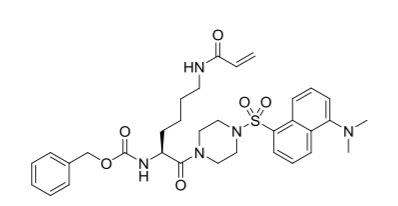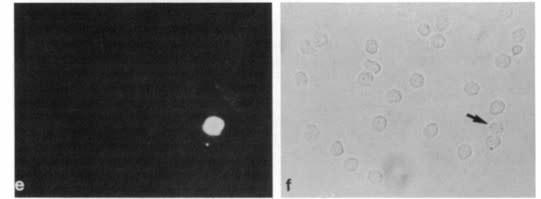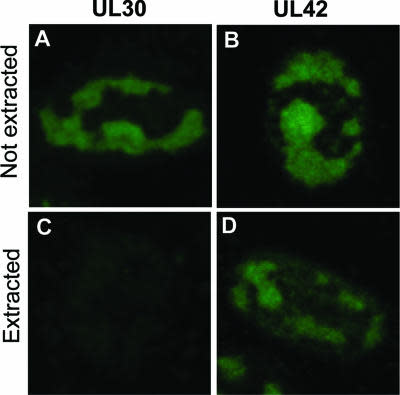Cat. #159670
VA4 – Tranglutaminase 2 Inhibitor small molecule (tool compound)
Cat. #: 159670
Sub-type: Inhibitor
Availability: Please enquire for quantities and pricing
Application: Has been shown to block TG2 transamidation activity inside cancer stem cells (SCC13 cells) resulting in abolished transamidase activity. Inhibitor blocks EMT, invasion and kills cancer stem cells. In mesothiolioma cancer stem cells, inhibition of TG2 reduces migration (invasion), and appears to increase markers of apoptosis.
This fee is applicable only for non-profit organisations. If you are a for-profit organisation or a researcher working on commercially-sponsored academic research, you will need to contact our licensing team for a commercial use license.
Contributor
Inventor: Jeffrey Keillor
Institute: University of Ottawa
Tool Details
*FOR RESEARCH USE ONLY (for other uses, please contact the licensing team)
- Tool name: VA4 – Tranglutaminase 2 Inhibitor small molecule (tool compound)
- Alternate name: VA4
- Cancers detailed: Colon
- Research fields: Cancer
- Molecular formula: C33H41N5O6S
- Tool sub type: Inhibitor
- Primary target: Tissue transglutaminase (TG2)
- Description: Transglutaminases are a family of enzymes that are responsible for mediating the formation of protein crosslinks of several diverse structural proteins (including fibronectin and collagen) through a transamidation reaction between peptide Gln and Lys residues. Tissue transglutaminase (TG2) is a member of this protein family, and is ubiquitously expressed in tissues, primarily found in the cytosol, but is also expressed in the nucleus, membranes, cell surface and extracellularly. TG2 is also able to adopt a compact, or closed conformation which results in minimal crosslinking activity but an increase in its GTP-binding function which affects several cellular signalling pathways. Unregulated transamidation activity is associated with diseases such as fibrosis, atherosclerosis, and celiac disease, while unregulated GTP-binding activity has been implicated with cancer cell proliferation, metastasis and aggressive tumours that are resistant to conventional therapeutic intervention. Studies have shown that TG2's GTP-binding activity is essential to the survival of several cancer cell lines, while its transamidation activity is not. VA4 is a targeted and irreversible covalent inhibitor of TG2 that locks the enzyme in its open' conformation in cells, abolishing its GTP-binding activity. In cellular tests, it has been shown to be selective for TG2 over other transglutaminases.
- Application: Has been shown to block TG2 transamidation activity inside cancer stem cells (SCC13 cells) resulting in abolished transamidase activity. Inhibitor blocks EMT, invasion and kills cancer stem cells. In mesothiolioma cancer stem cells, inhibition of TG2 reduces migration (invasion), and appears to increase markers of apoptosis.
- Purpose: Inhibitor
- Selectivity: TG2
- Iupac: Benzyl (S)-(6-acrylamido-1-(4-((5-(dimethylamino)naphthalen-1-yl)sulfonyl)piperazin-1-yl)-1-oxohexan-2-yl)carbamate
- Cas number: 2088001-23-2
- Molecular weight: 635.77
- Solubility: Soluble in DMSO
- Additional notes: Patent: US20190389814, PCT/IB2017/052162
Handling
- Purity: 635.77g/mol
- Storage conditions: Dry, dark and at 0 - 4° C for short term (days to weeks) or -20° C for long term (months to years). Aliquot to avoid freeze-thaw cycles. Lasts up to 3 years with proper storage
- Shipping conditions: Dry Ice
Target Details
- Primary target: Tissue transglutaminase (TG2)
Application Details
- Application: Has been shown to block TG2 transamidation activity inside cancer stem cells (SCC13 cells) resulting in abolished transamidase activity. Inhibitor blocks EMT, invasion and kills cancer stem cells. In mesothiolioma cancer stem cells, inhibition of TG2 reduces migration (invasion), and appears to increase markers of apoptosis.
References
- Akbar et al. 2017. J Med Chem. 60(18):7910-7927. PMID: 28858494.


![Anti-CAR Whitlow Linker [1C3C3]](https://cancertools.org/wp-content/uploads/Figure-6-Kimble-et-al.-J-Immunother-Cancer-2025-300x322.jpg 300w, https://cancertools.org/wp-content/uploads/Figure-6-Kimble-et-al.-J-Immunother-Cancer-2025-280x300.jpg 280w, https://cancertools.org/wp-content/uploads/Figure-6-Kimble-et-al.-J-Immunother-Cancer-2025-954x1024.jpg 954w, https://cancertools.org/wp-content/uploads/Figure-6-Kimble-et-al.-J-Immunother-Cancer-2025-768x824.jpg 768w, https://cancertools.org/wp-content/uploads/Figure-6-Kimble-et-al.-J-Immunother-Cancer-2025.jpg 1193w)

![Anti-CAR Whitlow Linker [1B4A1]](https://cancertools.org/wp-content/uploads/Figure-5-Kimble-et-al.-J-Immunother-Cancer-2025-300x396.jpg 300w, https://cancertools.org/wp-content/uploads/Figure-5-Kimble-et-al.-J-Immunother-Cancer-2025-227x300.jpg 227w, https://cancertools.org/wp-content/uploads/Figure-5-Kimble-et-al.-J-Immunother-Cancer-2025-776x1024.jpg 776w, https://cancertools.org/wp-content/uploads/Figure-5-Kimble-et-al.-J-Immunother-Cancer-2025-768x1013.jpg 768w, https://cancertools.org/wp-content/uploads/Figure-5-Kimble-et-al.-J-Immunother-Cancer-2025.jpg 970w)



